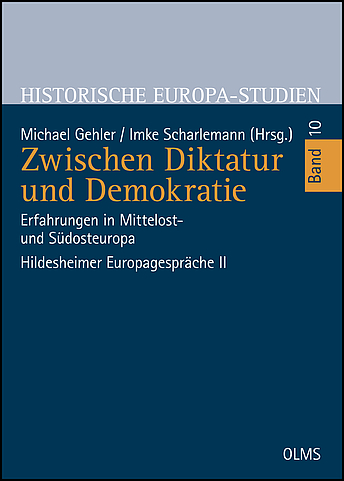Gehler | Scharlemann
Zwischen Diktatur und Demokratie
ISBN 978-3-487-14833-5
englisch The implementation of democracy as a form of government was not historically inevitable in Europe but was a long and difficult process. In the course of the First World War new democratic and republican forms of states arose, but these were short-lived. Authoritarian, dictatorial and fascist regimes followed. The countries of central, eastern and south-eastern Europe came under new dictatorships after 1945. Only after the collapse of the iron curtain in 1989 did these come to an end, opening new perspectives for democracy. How powerfully the shadow of fascist and communist dictatorships affected central, eastern and also southern and south-eastern Europe, and how this was dealt with, are illustrated by the very different experiences of the experts questioned in the “Hildesheimer Europagespräche”. Themes include Stalin, the Soviet Union and Poland, continuities and discontinuities as exemplified by reforms and revolutions in Czechoslovakia/the Czech Republic and Hungary, violent changes in Romania, the war in the “Balkans” and the related diplomatic and political memories, and Italy, Greece and Turkey.
Die Durchsetzung der Demokratie als Staatsform war keine historische Selbstverständlichkeit in Europa, sondern ein langwieriger und schwieriger Prozess. Im Zuge des Ersten Weltkriegs entstanden neue demokratisch-republikanische Staatsformen, die sich aber nur kurz behaupten konnten. Es folgten autoritäre, diktatorische und faschistische Regime. Die Länder der Mitte, des Ostens und Südostens des Kontinents gerieten nach 1945 in neue Diktaturen. Erst 1989 fanden diese mit dem Fall des Eisernen Vorhangs ein Ende, was neue Perspektiven für Demokratien eröffnete. Wie stark die Schatten der faschistischen und kommunistischen Diktaturen die Mitte, den Osten, aber auch den Süden und Südosten Europas verdunkelten, v. a. aber wie damit umgegangen wurde, zeigen sehr verschiedene Erfahrungen aus Expertenbefragungen der „Hildesheimer Europagespräche“. Es geht um Stalin, die Sowjetunion und Polen, Kontinuitäten und Diskontinuitäten am Beispiel der Reformen und Revolutionen in der CSSR/Tschechien und Ungarn, gewaltsame Veränderungen in Rumänien, die Kriege am „Balkan“ und die damit verbundenen diplomatischen und politischen Erinnerungen sowie um Italien, Griechenland und die Türkei. Namhafte Akteure, Experten und Zeitzeugen kommen zu Wort: Hüseyin Bagci, Erhard Busek, Stefan Creuzberger, Anneli Ute Gabanyi, Gerhard Jandl, László J. Kiss, Hannah Maischein, Bogdan Musial, Günther Pallaver, Miloš Rezník, Federico Scarano, Ludwig Steindorff, Arnold Suppan und Peter Zervakis.


